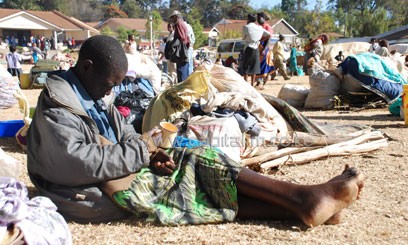
The panel however feels that the trials of Kenya’s Head of State and his deputy could in fact end up causing more harm than good/FILE
They accuse the International Criminal Court (ICC) of being hypocritical when it claims to champion the rights of the victims who have lived as Internally Displaced Persons (IDPs) for the last five years despite the intervention of the court soon after the PEV.
“The kind of hang ’em high justice you see at the ICC has absolutely nothing to do with the victims. For the last five years IDPs have been in camps rain come, rain go. Children who were born when they were displaced are now five years. What has the ICC done to ensure these kids go to school? What has ICC done to ensure that these people are resettled as it pursues this other kind of justice,” the CEO of the Africa Policy Institute Professor Peter Kagwanja poses.
In response to Kenya’s threatened pull out of the Rome Statute, ICC Spokesman Fadi el Abdallah has sought to allay fears that the cases were a witch-hunt insisting that they were undertaken in the interest of those killed and displaced in the 2007-8 post-poll bloodshed.
“The fact is, in the period of the post-election violence more than a thousand people were killed, thousands were injured and hundreds of thousands were forced to flee their homes. For the victims of this victims and to protect future generations from these crimes, justice must be done,” Abdallah has gone on record as saying.
The panel however feels that the trials of Kenya’s Head of State and his deputy could in fact end up causing more harm than good.
“The fundamental principal in setting up ICC was to consolidate peace through justice. Now, if we are saying that there is a sovereign head of state, a symbol of unity that you want to take away essentially, the question arises then are you within the original mandate of ICC?” former Assistant Minister for Justice and Constitutional Affairs Danson Mungatana again poses.
An act, he says, would effectively reverse the gains the ICC claims to have made by deterring a repeat of the 2007-8 PEV.
“Many commentators assess that the threat of ICC prosecution was a significant factor contributing to the peaceful election of 2013. If Kenya withdraws from the Rome Statute that factor will no longer be there in the future,” the ICC Spokesman had cautioned in a reverberation of former ICC Chief Prosecutor Luis Moreno-Ocampo.
The panel which included the recently appointed Centre for Multi-Party Democracy chairman Omingo Magara has therefore called on the Office of the ICC Prosecutor to withdraw its charges against Kenyatta, Ruto and Sang and instead focus on restorative justice.
“Why?” Kagwanja explains, “Because it took an activist agenda rather than approaching the complex Kenyan situation in a very sober manner, sober in the sense that the end of all this process is not just justice as perceived in the west but sustainable peace.”









































